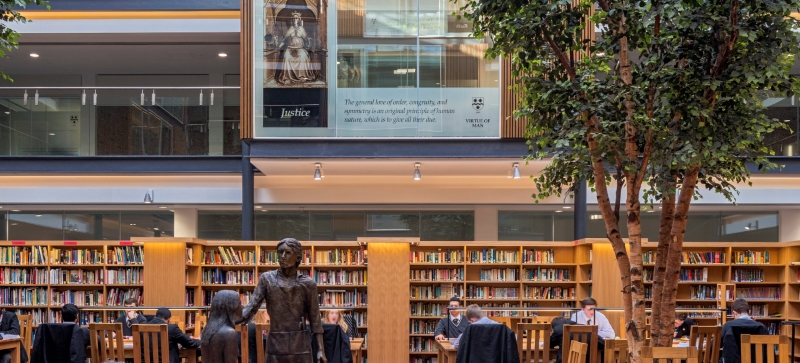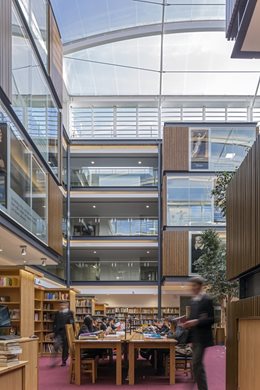I am a school librarian. In my day to day role, this means getting up at 6, dressing in ironic pencil skirts and cardigans, and making the hour long commute to Fulham, with a book.
I get to work at 8, open up, flick the switches, and the vast atrium that is my library fills with light. The school is still quiet, save for the odd burst of noise from the staff room door swinging open, and a couple of pupils filtering in and out to return or borrow books, or print their homework. I put out the newspapers, and make a quick sweep of the shelves, tidying here and there. I check my email, then get some laptop trolleys out. A few teachers flit in and out - a favour to ask, a book to borrow, how’s the family, book requests. Before I know it the bell has rung, and students stream through. Sixth formers, all with mountains of work to do, all with social lives to discuss. I spend the next couple of hours reorganising shelves and maintaining the expected level of silence (or thereabouts).
Now it is my lunch break. I chat with colleagues, have quick impromptu meetings. Now it is the students’ lunch break. My helpers are waiting for me, smiling or sometimes not. I do my best to keep them smiling. Chitchat, work side by side. Help some little ones find the books they want or didn’t know they wanted. Intervene in some shenanigans breaking out in that corner I can’t see from my desk. Their break is over so we shoo them out, straighten up, ready for more sixth formers. More shushing and moving, then they catch me off guard and I find myself stuck in the middle of banter. Back to shushing.
The bell rings. It is the end of the day, for them. I shoo them out again, take ten minutes for myself. A cup of tea and a chat. The bell rings. Back to the library. Thirty minutes solid of people streaming through the library door, returning and borrowing and printing and laptops and homework and clubs and younger ones waiting for their parents to get off work. Finally, at 4pm, the evening librarian arrives. I have one hour to do everything else.

"Study upon study shows us that children who read for pleasure daily in their own time achieve the coveted Educational Excellence at a far higher rate than their non-reading counterparts."
What's the role of a school library? SLA says we should supply up to date, relevant resources, promote reading for pleasure, provide a space for out of hours learning, and collaborate with teachers regularly. CILIP agrees and suggests a school library should also teach information literacy. The government of course, weighs in as well, from time to time, via a White Paper. The most recent one doesn't actually mention libraries (take from that what you will), but we can latch on to and interpret Department for Education's main points of Safety and Well Being, Educational Excellence Everywhere, and Preparation for Adult Life.
"Our teachers are busy teaching (...) they haven't the time to be the reading advocates that every school so desperately needs. So the library will do it."
A few years back, though, there was a White Paper which was interested in school libraries, and the role they should play in promoting reading for pleasure. And it stands to reason. Study upon study shows us that children who read for pleasure daily in their own time achieve the coveted Educational Excellence at a far higher rate than their non-reading counterparts. Our teachers are busy teaching, filling in reports, marking, attending parents’ evenings, setting detentions, attending meetings, and braving playground duty. They haven't the time to be the reading advocates that every school so desperately needs. So the library will do it.
In my ideal world, the school library would be many things: a safe, inclusive space, the beating heart of the school, a hub of creativity, a space which nurtures lifelong readers, a busy place where many things happen, a place that shows the world what reading and knowledge mean to its school.
In real life, a school library’s role is to be what its school needs it to be. I have worked as a librarian in two very different London schools. The first was a boys’ 11-16 comprehensive. It needed the library to be a safe, inclusive space, and to provide resources that would encourage the boys to open the pages and read - and sometime teach them to read. My current school is a 7-18 boys’ Catholic school. It requires the library to promote the Catholic ethos of the school, nurture reading for pleasure, provide space and resources for sixth form students to work and revise throughout the day and well into after school hours, and as it sits in the middle of the school and is constantly on show, must maintain an atmosphere of quiet study - as a positive example to the rest of the school.
"I work with a team of pupils, with varied backgrounds and abilities, who help in the library regularly, giving them a sense of belonging, achievement and responsibility."
 So how can the library achieve all this? My library, by no means perfect, serves its purpose well. We have worked hard to get it to where it is now, and have stacks of plans for improvement. The library is physically at the heart of our school, since a major refurbishment we had recently. The library would no longer be stuck in a forgotten corner of the school building. We are never out of sight, out of mind. It is stunningly beautiful, and says to the school community, “we place great value in our library.” The right atmosphere is there, and yes, the library is pretty, but how do I ensure it’s safe and inclusive?
So how can the library achieve all this? My library, by no means perfect, serves its purpose well. We have worked hard to get it to where it is now, and have stacks of plans for improvement. The library is physically at the heart of our school, since a major refurbishment we had recently. The library would no longer be stuck in a forgotten corner of the school building. We are never out of sight, out of mind. It is stunningly beautiful, and says to the school community, “we place great value in our library.” The right atmosphere is there, and yes, the library is pretty, but how do I ensure it’s safe and inclusive?
I have worked to curate a range of resources to reflect the school population and the community beyond. I will be working this year with our Learning Support department and school counsellor on supporting the school’s focus on pupils’ well-being with appropriate resources. I work with a team of pupils, with varied backgrounds and abilities, who help in the library regularly, giving them a sense of belonging, achievement and responsibility.
How does my library nurture lifelong readers? A librarian should read widely. I do. This is important because the school librarian must be able to get to know pupils’ reading interests as best they can, and guide them to their next book. I try to get to know my keen readers very well, and they are always delighted when they come into the library to find that I’ve held on to a pile of books I thought they’d like. Some of these children end up reading so much that I find I’ve run out of books to recommend to them. That is why it is so important for the library to regularly get in newly published books. There needs to be a pile of new books on display every week.
"A librarian should read widely. I do."
More effective than any of these things, though: author visits! We hadn’t had an author visit in many years (excepting one pupil’s father, who kindly agrees to come in year after year to judge our literary competition and present the winners with their awards). The budget never seemed to stretch that far. Last year, however, we were lucky enough to win a visit from Sam Hepburn, during the Southwest London CWISL quiz. We quickly got in multiple copies of each of her books and the English department made use of her website with their year seven classes. I put up a display in the library in anticipation of her visit, and all of her books went out that very day. The following week, she stood on the stage of our theatre, captivating 180 eleven year old boys with her stories. The impact of that one-hour visit was keenly felt. From the stillness in the theatre to the buzz of conversation as the boys filed out to their next lesson, to the enthusiastic feedback from their teachers. We’ll certainly be doing that again.
"When a school library’s budget is already fairly small though, the tiniest cut is felt too keenly. What is the library to do?"
I do library lessons, competitions, passive programmes, book clubs, making a fuss of World Book Day, developing relationships with teachers. And it’s still not enough. There need to be more author visits - I hope to acquire a patron of reading in the near future. And we need to work on becoming the heart of the school, not just in the geographical sense. The culture of reading must spread throughout the school. There are a thousand ways to do this, and we will try.
So much of this costs money. Author visits, new books, a fully trained, full-time librarian. So we look to the government. Schools around the country are suffering huge budget cuts, ours included. Schools have to adjust their budget structure to match the blow they’ve been dealt. When a school library’s budget is already fairly small though, the tiniest cut is felt too keenly. What is the library to do? Be content with the fiction that is already on the shelves, so the book budget can go on new textbooks and supplementary materials for the seemingly constant changes in curriculum and exams. Buy fewer newspapers. Forego the author visit this year. Tell every keen reader who comes into the library to request a new book, “I’m sorry, we’re not taking requests this year.”
It shouldn't have to be that way. If the government provided funding, specifically earmarked for school libraries, that would make consistently good provision a possibility across the country. That is the number one thing the government can do to help. Find the cash.
The other key supporters of school libraries? Authors. Keep doing what you do best! Write your hearts out, because our number one job is to get those kids to love reading. The easiest and most effective way for a library to do that is to present its children with great books. Each new book I buy has the potential to open a child’s eyes to the joy of reading. You did that.
"tell us how we can get you into our schools."
Also, make yourself available to schools, and make the process for school visits clear. There are some great author websites out there, engaging their readers further in the worlds of their books. Don't forget to include a little info page for teachers and librarians - those of us lucky enough to be able to include author visits into our budgets. The Society of Authors of course gives excellent general guidance on how to go about booking an author visit, but different authors will have different ways of doing things. So tell us how we can get you into our schools.
And finally, get on social media and in the news; harp on about the importance of school libraries. We already love you. This will simply make us love you more.
Suzanne Bhargava
 Suzanne Bhargava is a librarian at The London Oratory School, currently working towards CILIP’s professional librarian registration. With seven years as an English teacher and seven years as a librarian under her belt, she is a passionate advocate for reading and education.
Suzanne Bhargava is a librarian at The London Oratory School, currently working towards CILIP’s professional librarian registration. With seven years as an English teacher and seven years as a librarian under her belt, she is a passionate advocate for reading and education.
Further Reading
Beating Heart of the School | APPG Report
Patron of Reading